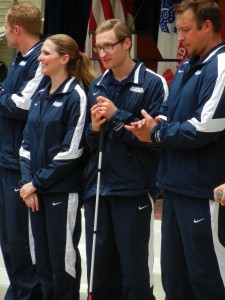WASHINGTON— Every night Navy Lt. Brad Snyder dreams he still can see.
But every morning when he wakes up, he is once again reminded that he is blind, the result of a roadside bomb explosion while he was deployed in Afghanistan last year.
As he recovered in a hospital in the U.S., Snyder received countless visits from friends and other well-wishers. Snyder was motivated by the outpouring of support to not just get up—but to take on a new challenge – competitive swimming.

Navy Ltd. Brad Snyder waits to receive his awards for his competition in the 2012 Warrior Games. Snyder was blinded last year in Afghanistan as a result of an IED explosion. He won seven medals at the Warrior Games and will compete in the 2012 Paralympics in London.
“I felt like I owed it to them to reciprocate that commitment and to demonstrate to them that I’m going to get back on my two feet,” he said. “I’m definitely going to find an avenue to succeed just like I used to. I just have to find a new way to do it.”
Snyder, who had been a competitive swimmer in college, was recognized alongside 49 other athletes who participated in the 2012 Warrior Games in a ceremony in the Pentagon Center Courtyard Monday.
At the 2012 Warrior Games, held in Colorado Springs, Colo., from April 30 to May 5, 220 wounded service members and veterans competed in seven events: swimming, track and field, wheelchair basketball, seated volleyball, track and field, shooting and archery.
Snyder finished the games with seven gold medals, four in swimming and three in track. He competed in the U.S. Paralympic trials earlier this month, winning all of his events and will represent the United States this summer.
Yet, for the military athletes, the Warrior Games are about much more than medals. The Warrior Games inspire participants to push through immense challenges to achieve something some might think impossible: play in a competitive sport.
“Not everyone who competed won a medal, but collectively you demonstrated resiliency to overcome many challenges,” said Army Chief of Staff Gen. Ray Odierno. “It represents a survival and conviction of the heart that each and every one of you brought to the games.”
The Warrior Games allows the service members and veterans to demonstrate how strong they have become since being wounded, several said.
“For me it was a great tool to be able to incorporate myself back into society, not just physically and socially, but also mentally,” said retired Special Operations Staff Sgt. Alfredo Delosantos. Delosantos was wounded in Afghanistan in 2008 after being hit by a rocket-propelled grenade.
Succeeding in the games provides strength for these military members and veterans to move forward in other areas of their life.
“I’ve found ways to mitigate blindness where I can compete and I can compete well, and it gives me a lot of confidence moving forward to other aspects of life that I’m struggling in,” Snyder said.
The Warrior Games athletes gain inspiration from training and competing alongside those who have been wounded or become ill, like them.
“Getting to see people in the same shoes as me, physical disabilities, anything,” said Marine Corps Cpl. Dylan Kelly, whose seated volleyball team won the silver medal. “They are able to get up and they tell themselves they are going to do something and they’re going to do it, regardless of how many people tell them no—they can’t.”
The perseverance of these athletes sends a strong message to the enemies of the United States, Defense Secretary Leon Panetta said: “You can wound me and you can hurt me, but you can never take my life, my spirit or my hope away.”
A year to the day from the IED explosion that blinded him, Snyder will compete in London for the Paralympic Games.
“If I can succeed on that day or even just competing that day, it is representative of that idea that I’ve beat it,” he said. “I have persevered. I have succeeded. I have not let it beat me and I’m going to allow this thing to kind of perpetuate success in other realms of my life.”
